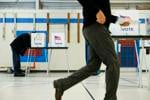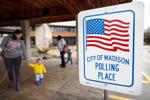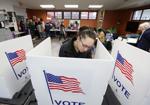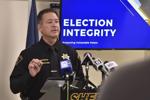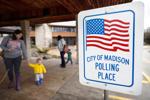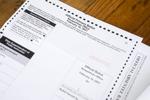The state Department of Justice will investigate claims by at least two Wisconsin residents who admitted to fraudulently ordering absentee ballots for others in an effort to show that such fraud is possible.
Details into the investigation were not made available Friday. But Gillian Drummond, spokesperson for Democratic Attorney General Josh Kaul, said DOJ has been in contact with Racine County District Attorney Patricia Hanson and will be investigating the matter.
The probe pertains to actions announced Thursday by Harry Wait, president of the conservative group Honest Open Transparent Government, who admitted to ordering 10 ballots online for people including Republican Assembly Speaker Robin Vos and Democratic Racine Mayor Cory Mason, and asked that they be delivered to his home.
On Friday night, Wait said he received Mason’s absentee ballot in the mail Friday afternoon and told a reporter, “We are going to return Cory’s ballot to City Hall with a film crew.”
People are also reading…
Racine County Sheriff Christopher Schmaling — who initially did not indicate plans to investigate the alleged crimes, which took place in his county, but instead demanded that the state Elections Commission suspend portions of its website — also confirmed the investigation in a Friday statement.
“Any statements alleging the Sheriff’s Office would not investigate this issue or take appropriate enforcement actions were wrong,” Schmaling said. “After all, it was the Sheriff’s Office that brought this problem to the attention of the public, and we called for a statewide investigation because this issue has statewide implications.”
Two members of the bipartisan Wisconsin Elections Commission, both Democratic appointees, said Thursday they want to see felony charges brought against Wait, who said he requested the absentee ballots to show vulnerabilities in the state’s election system.
“I’m astonished and outraged that he thinks this is something cute, when what he’s doing is committing crimes and bragging about it in an attempt to undermine our voting system,” Commissioner Ann Jacobs said. “Sometimes when people confess fully in the newspaper, we don’t need to go into a lengthy analysis over it.”
Vos, R-Rochester, described Wait’s actions as “sad,” adding that, “If election integrity means anything, it means we all have to follow the law — Republicans and Democrats alike.”
“People decided intentionally to break the law and commit fraud, and that’s the only reason we’re here — period,” Commissioner Mark Thomsen said Thursday. “And what happens when people commit crimes, they should be referred and prosecuted. That would end it. That would end this game plan. As soon as a few people go to prison for falsely using people’s names, that’s going to stop.”
Matter tabled
At an emergency meeting late Thursday, the commission chose not to immediately pursue criminal referrals against Wait, as Jacobs and Thomsen requested, but agreed to consider doing so in a future meeting. The commission also voted unanimously to notify about 4,000 voters who have recently requested an absentee ballot and have a separate mailing address on file and may be victims of a fraudulent absentee ballot request, and agreed to notify local clerks of the incident.
Requesting an absentee ballot for another individual without their knowledge or consent is a crime, and while Wait apparently did so to show what he said were vulnerabilities in the state’s election system, there is no evidence that the practice was widespread in the 2020 election. Actually casting someone else’s ballot would also be flagged by election officials using the state’s voter database if that person had already voted or votes later.
“I could have ordered hundreds of them, a thousand of them,” Wait said Thursday. “There’s no limit.”
It’s unclear if any of the ballots Wait requested were mailed to his home. None of the ballots had arrived as of Friday, Wait said.
He also said he had a friend in Michigan try to request his (Wait’s) ballot via MyVote, but the irregularity was noticed by the local clerk, who then contacted Wait, and no ballot was sent.
Wait’s co-conspirator, Adrianne Melby, of Burlington, told The Journal Times that, at her request, a friend successfully had Melby’s ballot sent to the friend’s address.
MyVote allows people to request an absentee ballot online as long as they have the voter’s name, birthdate and qualifying photo ID; the ID is not required if the voter has previously uploaded it to the site or been deemed “indefinitely confined.”
Video posted
Wait posted a video to the online video platform Rumble.com showing him requesting absentee ballots for Vos and Mason. On the video, Wait inputs the elected officials’ names and birthdates into MyVote, asks to have the ballots mailed to his home address rather than the address on file, and clicks the “indefinitely confined” option. A prompt on the screen indicates that he successfully submitted an absentee ballot request.
“I stand ready to be charged for exposing these voting vulnerabilities when I ordered Mason’s and Vos’ absentee ballot online, all without providing a photo ID or identifying myself,” Wait wrote in the video caption.
Wait turned himself in to the Racine County Sheriff’s Office on Thursday. Schmaling, a Republican who has accused state officials of violating election laws, instead used the cases to attack the Wisconsin Elections Commission and demanded the agency suspend portions of its website.
Schmaling last year called for five members of the commission to be charged with crimes for waiving the state’s special voting deputy requirement. The commission voted in March 2020 to tell clerks they need not send poll workers into nursing homes to assist with absentee voting after many were turned away due to the pandemic.
Wolfe’s stance
The Elections Commission’s nonpartisan administrator, Meagan Wolfe, said Thursday there are no vulnerabilities with the MyVote system, which can be used to request an absentee ballot by using the registered voter’s birthdate and name. Voters need to have a valid voter ID on file in order to request a ballot.
“Just like a nefarious individual could misuse the personal information or identity of someone to commit something like a financial fraud, someone could also unlawfully use an individual’s personal information to commit election fraud,” Wolfe said. “However, there are many checks in the system at both the state and the local level to prevent and detect such activity.”
The Elections Commission, which administers MyVote Wisconsin, said in a statement Thursday that “people who intentionally misuse the MyVote application can be subject to severe criminal and civil penalties. It is illegal to provide false information or use another person’s information to unlawfully request the ballot of someone else.”
A recount, court decisions and multiple reviews have affirmed that Biden defeated Trump in Wisconsin. An Associated Press review found that only 24 people out of nearly 3.3 million who cast ballots have been charged with election fraud in Wisconsin.
Journal Times reporter Adam Rogan contributed to this report.
The Associated Press reviewed every potential case of voter fraud in six battleground states — Arizona, Georgia, Michigan, Nevada, Pennsylvan…






